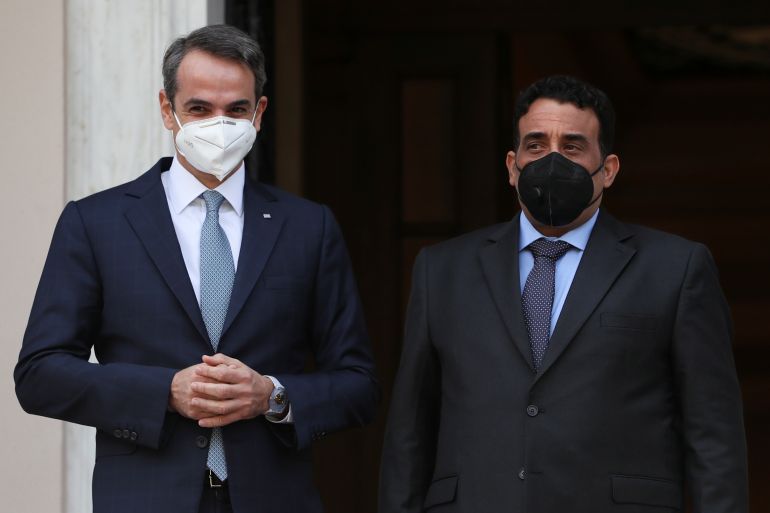Greece, Libya to hold talks over maritime border demarcation
Greece and Libya to discuss delineating maritime boundaries, Athens says after a visit by Libya’s al-Menfi.

Greece and Libya have agreed on the “immediate resumption” of talks to mark out their maritime zones in the Mediterranean Sea, according to Greek Prime Minister Kyriakos Mitsotakis.
His comments on Wednesday came after meeting in Athens with the president of the Libyan Presidential Council, Mohamed al-Menfi.
Keep reading
list of 4 itemsGreece accuses Turkey of trying to provoke it with migrant boats
Turkey and Libya renew commitment to contested maritime deal
Greece FM Dendias to visit Turkey amid Mediterranean crisis
“I want you to know that in Greece, Libya will always have a stable friend and ally within the European Union, so that … [it] can find its way back to stability and prosperity,” Mitsotakis told al-Menfi.
For his part, al-Menfi stressed the historical ties and friendship between the two countries and described Greece as the main “gateway” of Libya to the European Union.
Contentious accord
Libya’s new unity government took office on March 16, succeeding two warring administrations that had ruled eastern and western regions during a decade of violent chaos since the overthrow of autocratic leader Muammar Gaddafi.
Mitsotakis said Greece aimed to reset relations with Libya, which were soured by the then-Government of National Accord (GNA) in Tripoli signing a maritime boundary accord in 2019 with Turkey.
The issue has fed into tensions between Greece and Turkey over territorial and energy issues in the eastern Mediterranean that brought the two NATO allies close to armed conflict last year.
That accord, which prompted Greece to expel al-Menfi, Libya’s ambassador to Athens at the time, mapped out a sea boundary between Turkey and Libya close to the Greek island of Crete. Athens has said it has no legal force and must be cancelled.
Libya’s new government has not indicated it would be willing to overturn its controversial deal with Turkey.
Libyan Prime Minister Abdul Hamid Dbeibah visited Ankara on Monday. Speaking after talks with Turkish President Recep Tayyip Erdogan, he said the deal serves both Turkey’s and Libya’s national interests. But he added it was important to start a dialogue that would take into account all involved parties’ interests.
For his part, Erdogan said the deal “has secured the interest and future of both countries”.
Turkey has been closely involved in Libya, backing the GNA against the eastern-based forces of renegade military commander Khalifa Haftar.
It sent military supplies and fighters to Libya, helping to tilt the balance of power in favour of the Tripoli government, with which it had signed the maritime deal.
Referring to Libya’s plan to hold elections by the end of the year so that Libyans can take their country’s destiny “into their own hands”, Mitsotakis said “a prerequisite for this is the withdrawal of all troops from Libya.”
“Libya is now entering a delicate process of negotiating a new treaty with Greece and renegotiating an old one with Turkey,” said Al Jazeera’s John Psaropoulos, reporting from Athens.
“Al-Menfi … said in Athens today the path between Libya and the European Union, passes through Greece,” he added.
“In other words, if Libya hopes for European Union investments that will help rebuild the war-torn country, it must make good with a member of the European Union that has serious complaints against it.”
Last year, Greece signed an agreement with Egypt designating an exclusive economic zone in the eastern Mediterranean, which Turkey has said infringes on its own continental shelf, and which overlaps with the maritime zones it agreed with Libya.
Greek Foreign Minister Nikos Dendias is due to visit Turkey on Thursday for talks on various issues of contention.